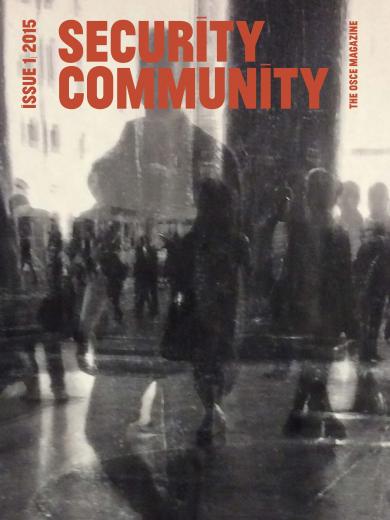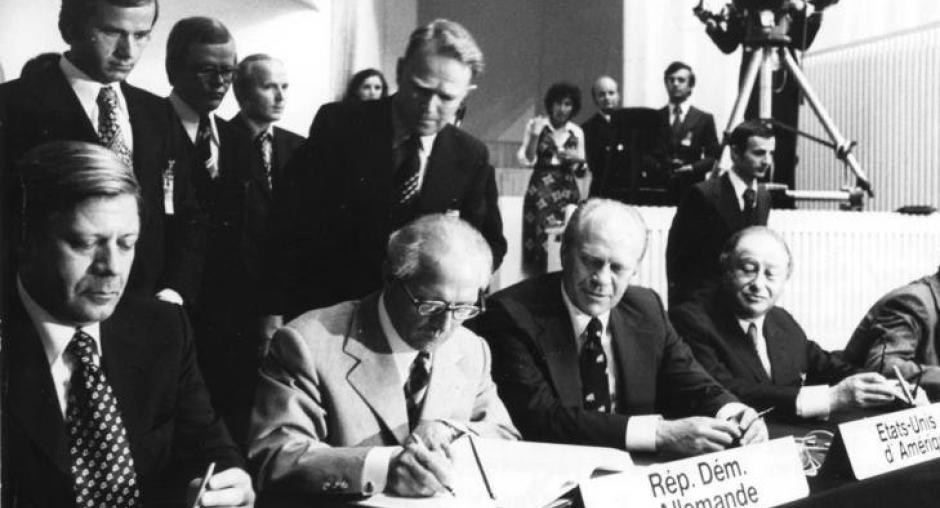Reviving the Helsinki Spirit: 40 years of the Helsinki Final Act
On 1 August 1975, a 40-year quest for establishing a comprehensive and inclusive framework for security and co-operation in Europe was launched in the Finnish capital Helsinki. In a historic demonstration of multilateral consensus, the 1975 Helsinki Final Act saw the heads of 35 States (the NATO countries, the Warsaw Pact countries, neutral and non-aligned States) commit themselves to mutually beneficial dialogue. The drive: to bridge the East-West divide, to move from mere “détente” to actual “rapprochement.” That commitment, in the 1990s, led to the establishment of the Organization for Security and Co-operation in Europe (OSCE), which is now the world’s largest regional security arrangement under Chapter VIII of the United Nations Charter.
Signing the Helsinki Final Act did not end the Cold War, but it was a revolutionary turn towards ending it, through openness and co-operation. The participating States subsequently agreed to share military information and inform each other of the movement of troops, military activities and exercises. The signatories also recognized that true security means more than freedom from war, that it requires economic well-being, a healthy environment and respect for human rights and fundamental freedoms. Helsinki was the beginning of a process of dialogue for peace, pursued with patience and unerring persistency, that has become signature for the OSCE.
The OSCE has since been a vital player in fostering stability in Europe. It helped end the wars in the former Yugoslavia and is still aiding the countries of the region with activities aimed at fostering reconciliation and regional co-operation, democratic institutions and the rule of law. In places like Transdniestria, Nagorno-Karabakh and South Ossetia, where simmering conflicts continue to hamper peaceful development, the OSCE has served as a facilitator in the search for lasting solutions. And because security in people’s lives goes beyond resolving military conflict, the organization is geared towards promoting access to a whole range of fundamental needs, like clean water, education and free elections; access to justice, gender equality and life free from discrimination and harassment. Through its network of field operations, the OSCE has a unique tool to implements projects that foster security and co-operation and improve people’s lives.
As security threats evolve, so has the OSCE’s focus shifted. In addition to more traditional challenges, the OSCE is increasingly involved in addressing challenges that transcend national borders: cybercrime, terrorism, trafficking, corruption, migration. In a globalized world, it is indispensable to build strong partnerships with the UN and other international organizations. We also continue to strengthen the close links with our Mediterranean and Asian Partners for Co-operation.
Several OSCE institutions and structures work together to support OSCE participating States with the implementation of their commitments. These include the Office for Democratic Institutions and Human Rights, the Representative on Freedom of the Media, the High Commissioner on National Minorities, and the Parliamentary Assembly. All of them have been working in concert to help resolve the conflict in and around Ukraine. The Trilateral Contact Group, with the participation of the OSCE, is negotiating practical steps to stop the fighting and seeking solutions towards a lasting political settlement. The Special Monitoring Mission to Ukraine, deployed in March 2014, continues to monitor and report on the situation in the whole country and, in the East, is watching over a fragile ceasefire under often dangerous conditions. The OSCE Project Co-ordinator in Ukraine, a field presence that has worked out of Kyiv for 15 years, is assisting the government with reforms and national dialogue.
European security and co-operation was envisioned by the signatories of the Helsinki Final Act to be guided by ten fundamental principles, dubbed the Helsinki Decalogue: sovereign equality, refraining from the use of force, inviolability of frontiers, territorial integrity, peaceful settlement of disputes, non-intervention in internal affairs, respect for human rights and fundamental freedoms, equal rights and self-determination of peoples, co-operation among states and fulfillment in good faith of obligations under international law.
For 40 years, these principles have served as the foundation of the European security order. The stipulation in the Helsinki Final Act that each of them is of primary importance and will be interpreted taking into account all others is the defining compass for dialogue among the OSCE’s now 57 participating States.
The crisis in and around Ukraine, which already has cost more than 6,000 lives, has reminded us, tragically, that respect for these principles cannot be taken for granted. We need to redouble our efforts to reaffirm their legitimacy and make them more difficult to defy. We must join forces to revive the spirit of Helsinki and draw inspiration from the leaders of 40 years ago who found the courage to come to the table and, with no evident prospect of success, engaged in dialogue to prevent a new war.
Perhaps we are seeing, not yet the beginning, but the hint of a new era in European security. Difficult questions are crystalizing, questions our forerunners in Helsinki may not have been able to pose. But today, as the OSCE’s response in Ukraine has shown, we are equipped with experience and tools which those founding leaders did not have. Now, as then, we need courageous men and women who will join a discussion fraught with uncertainties, to ensure that the curtain that was raised on security in Europe in Helsinki back in 1975 remains open.
By Lamberto Zannier, the Secretary General of the OSCE
Welcome to Security Community
Security Community is the OSCE’s online space for expert analysis and personal perspectives on security issues.
The views expressed in the articles are those of the authors and do not necessarily reflect the official position of the OSCE and its participating States.


